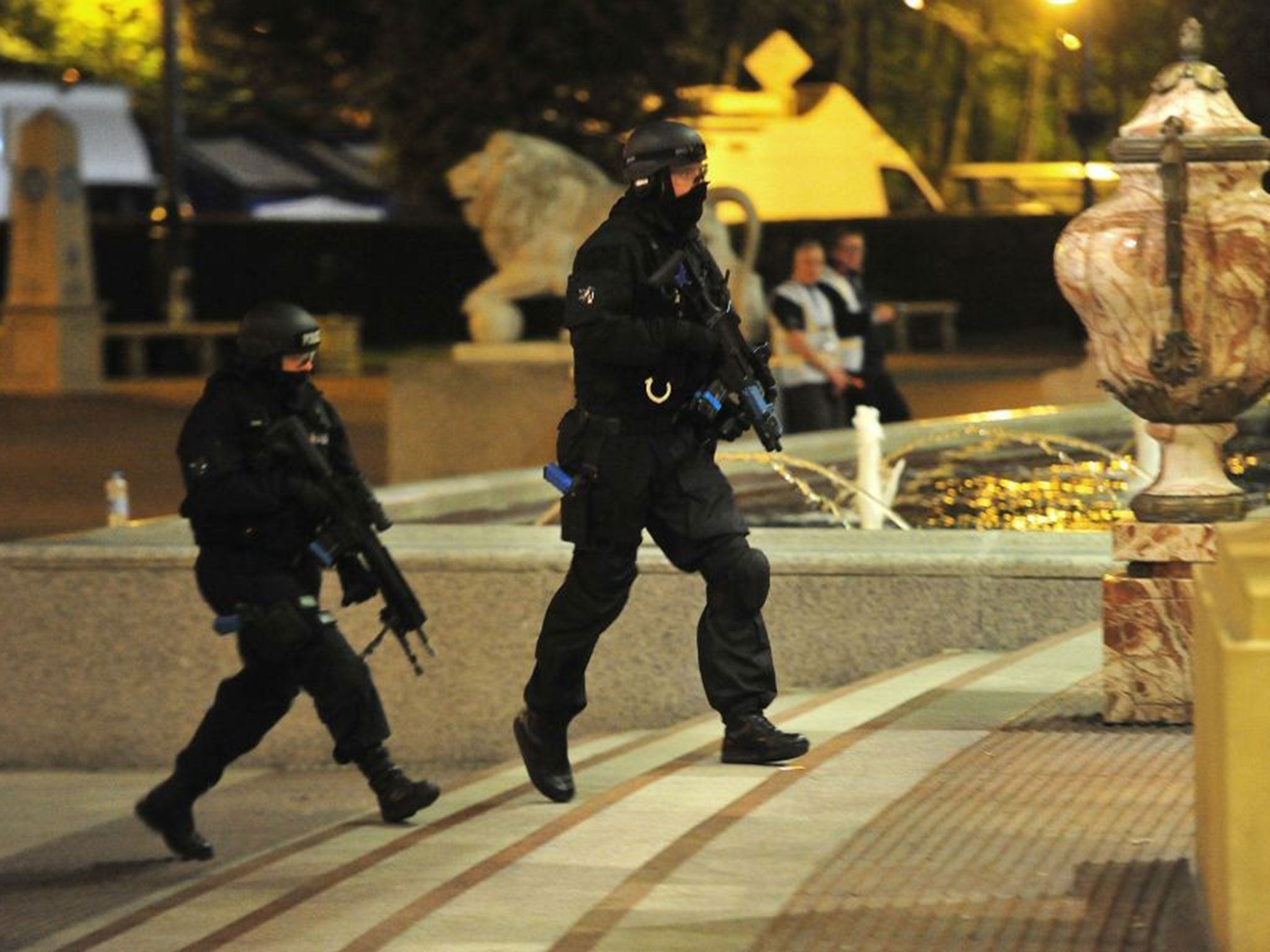Manchester Arena inquiry: Mistakes from ‘disaster’ training exercise a year before bombing were not fixed
Firefighters arrived 90 minutes late to simulated Isis suicide bombing in 2016, and two hours late to 2017 terror attack

Emergency services did not address the problems highlighted by a “disastrous” terror training exercise in Manchester a year before the bombing, an inquiry has heard.
A lawyer representing bereaved families said victims were “denied vital assistance” because firefighters did not arrive at Manchester Arena for more than two hours after the blast.
A public inquiry into the attack, on 22 May 2017, heard the fire service had also been delayed in training exercise that simulated a suicide bombing in the Trafford Centre.
Operation Winchester Accord was described as “a disaster” by inquiry chair Sir John Saunders, who said firefighters arrived an hour-and-a-half late in the simulation.
Michael Lawlor, a senior national inter-agency liaison officer with Greater Manchester Fire and Rescue Service (GMFRS), concluded at the time that police had focused on "neutralising the situation rather than what the other agencies [fire and ambulance] need to do”.
Giving evidence on Wednesday, Mr Lawlor said that he was concerned about a “communications failure” during the exercise and contacted Greater Manchester Police (GMP) “trying to plug that gap”.
His colleague John Fletcher, GMFRS group manager at the time of the bombing, emailed a GMP officer in the days after Winchester Accord to voice his concerns about the communication breakdown.
He told the inquiry that while observing the exercise, he was surprised at the length of time it was taking to deploy GMFRS and North West Ambulance Service (NWAS) personnel to carry out triage and rescue.
Mr Fletcher asked his police counterpart about considering preparing a one-day awareness course for commanders from emergency services “to discuss individual agency capabilities”.
He wrote: “I realise this is a big ask but think it would go a long way in stopping repetition of the same learning outcomes from multiple exercises.”
Communication remained a concern from a “table-top” exercise, named Hawk River, in March 2017 in which the police officer nominated to declare a marauding terrorist attack said they did not have time to give a “running commentary” to fire and ambulance services because of the number of tasks they had.
On the night of the bombing, police declared a marauding terrorist attack some 16 minutes after the blast but did not inform the fire and ambulance services.
The inquiry previously heard that incorrect reports of gunfire affected the emergency response, and that only one paramedic entered the scene of the blast for 40 minutes.
Firefighters were still trying to find out where they should meet other emergency services after the last survivor had been evacuated, because they had not been informed of a “forward command point”.
GMFRS readied its specialist terror attack response but had been waiting at a station three miles from the arena after the mistaken reports of an active shooter.
The 2018 Kerslake Report said concluded: “The fire service was effectively ‘outside the loop’, having no presence at the rendezvous point established by the police, little awareness of what was happening at the arena and only a very limited and belated presence at Strategic Gold Command.”
John Cooper QC, representing bereaved families of some of the 22 victims, said there was a “great deal of concern” over suggestions that the attack had come as a surprise to authorities.
He said that UK’s terror threat level at the time meant that attacks were “highly likely”, stations like Manchester Victoria were known to be at particular risk and the Winchester Accord exercise had predicted an Isis suicide bombing.
In pictures: Terror attack exercise in Manchester
Show all 7“What happened at the arena at the time, tragically , was entirely predictable,” Mr Cooper said. “This wasn’t a surprise and the emergency services should have been well prepared for it shouldn’t they?”
Mr Lawlor agreed with his statements and said that on the night of the attack, two specialist vehicles carrying 12 responders were available in the event of a terrorist attack.
The crews could have taken 10 stretchers to the City Room, where Salman Abedi detonated his device, to assist moving casualties to a holding point before transportation to hospital.
First aid-trained firefighters also had equipment to treat the wounded and possibly stem bleeding, Mr Lawlor said.
Mr Cooper QC said the specialist equipment never arrived at the arena, and the specialist training that firefighters had was “taken out of the equation”.
“I’m in no way impugning the brave individual men and women of [GMFRS] who no doubt would have wanted to be there, providing their skill and providing their care to stricken members of the public,” he added.
“The fact of the matter is, for some reason, and the chair will decide what, vital assistance to casualties , vital assistance to the dying, was denied of them, wasn’t it?”
“That’s correct, sir," Mr Lawlor replied.
The inquiry continues.
Subscribe to Independent Premium to bookmark this article
Want to bookmark your favourite articles and stories to read or reference later? Start your Independent Premium subscription today.
